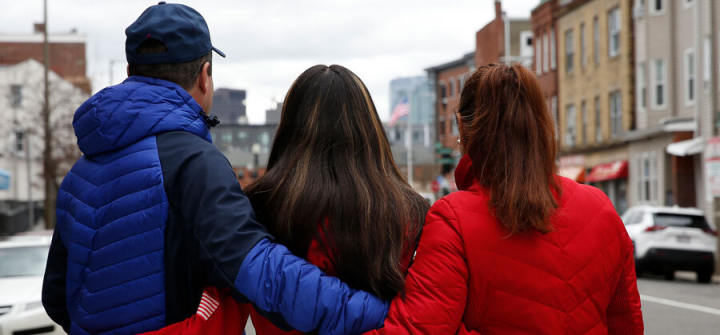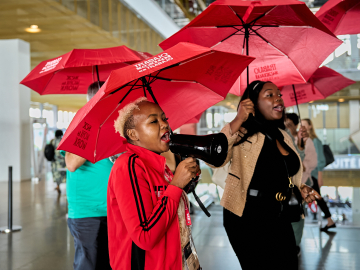COVID-19’s Impact on Undocumented Immigrants in Western Massachusetts
During COVID-19’s onslaught in April 2020, an undocumented patient called our clinic seeking a COVID-19 test so that she could return to work. Further questioning revealed she’d recently developed a cough and fever, and that she works in close proximity to multiple people—including 3 co-workers who recently left work early feeling ill. She lives in a 1-bedroom apartment with her husband, children, and another couple (who recently tested positive for COVID). Unfortunately, it would take 2 days for her to get her test results. We wish this was an isolated event, but we’ve frequently witnessed this as resident physicians participating in our institution’s Community Health and Advocacy pathway.
We entered our “community month” amid mounting anxiety and fear surrounding COVID-19. We changed gears from in-person to telehealth appointments—each bringing more stories of undocumented workers. Some described close-knit living quarters that make distancing impossible. Others relied on crowded transportation, and didn’t have enough masks for the journey to work, never mind on-the-job. Many expressed concern about obtaining food amid job insecurity and dwindling salaries. Others had no alternative but to rely on elderly relatives for child care, putting their loved ones at risk. They all shared a common thread: Worry over what they’d do if they or their family members become ill with the dreaded COVID-19. Resoundingly, it was clear they felt vulnerable, frightened and exposed.
It is of the utmost importance that we as a medical community take ownership and responsibility for protecting the most vulnerable in the midst of a public health crisis. We believe that action for and on behalf of the marginalized must be proactive and coordinated. As physicians, we have a platform, a special place of privilege from which we can advocate for and protect the most vulnerable patients.
Our group designed a structured phone questionnaire to determine the concerns of undocumented patients and identify strategies to address their greatest needs. We created infographics to disseminate crucial COVID-19 related information; we collected and distributed masks and food supplies.
We’ve also seen how anti-immigration policies such as restrictions to Deferred Action for Childhood Arrivals and asylum approval, more stringent measures by Immigration and Customs Enforcement, and family separations at the US borders have engendered fear and mistrust of authorities among undocumented immigrants in the US (a group estimated to include 22.1 million people). Many go without health insurance; the Affordable Care Act does not include coverage for undocumented immigrants. Due to these restrictions, many undocumented immigrants have no established primary care providers. Some simply avoid health care altogether due to exorbitant costs or the fear of detainment or deportation. Poor access and avoidance, in turn, leads to heavy dependence upon emergency departments and increased prevalence of multiple undertreated chronic diseases. Diabetes in the Latino community is 22%—the highest for any racial or ethnic group within the US.
The lack of health care access and predisposition to chronic underlying conditions makes undocumented immigrants particularly susceptible to adverse health outcomes from COVID. The nature of their “essential” jobs hampers their ability to physically distance or fully shelter in place, compounding their risk. And when one group gets disproportionately ill from a new contagious disease, ultimately the health of the nation at large will suffer, too; this pandemic has shown us how interconnected we are.
Outpatient clinics are feeling the overwhelming burden, with limited resources to address disparities amplified by the pandemic. Some US clinics arranged for private funding to care for undocumented immigrants—providing not just health care, but food, sanitation products and personal protective equipment. However, the new US Citizenship and Immigration Services public charge rule, implemented on February 24, 2020, curtails admissibility to the US if people cannot care for themselves without becoming public charges. Thus, some undocumented immigrants may be afraid to utilize programs like the Supplemental Nutrition Assistance Program (SNAP), as it can reduce their chances of eventually obtaining legal status. This leaves many dependent upon community groups, pantries and public school systems for food.
Social justice is at the heart of public health. Quality health care is a basic human right and should be provided irrespective of socioeconomic standing. We must strive for health equity—acting as if we truly believe that every life has equal value. We must do better for the undocumented immigrants living among us. We can only obtain the high standard of public health that we aspire to if we care for the wellbeing and safety of the entire population.
A pandemic affects the very fabric of society; its tentacles far-reaching, not discriminating based on race, religion or gender. Yet, despite an unrelenting flow of information, the stories of some marginalized communities, such as undocumented immigrants, often go unheard. We must, as a society, reflect on our responsibility to surface stories of the people like our patient back in April.
Unsurprisingly, our patient tested positive for COVID-19, ultimately requiring hospitalization. She exposed unknown numbers of vulnerable people to the disease. We hope that with continued advocacy and policy changes, a story like this will become a rarity.
Petal Elder, MD, MPH is a PGY-2 Internal Medicine resident at the University of Massachusetts Medical School-Baystate Medical Center.
Caitlyn Wasserman, MD is a PGY-3 Internal Medicine resident at the University of Massachusetts Medical School-Baystate Medical Center.
For the latest, most reliable COVID-19 insights from some of the world’s most respected global health experts, see Global Health NOW’s COVID-19 Expert Reality Check.
Join the 50,000+ subscribers who rely on Global Health NOW summaries and exclusive articles for the latest public health news. Sign up for our free weekday enewsletter, and please share the link with friends and colleagues: https://www.globalhealthnow.org/subscribe
COVID-19 made the future even more uncertain for many vulnerable undocumented immigrants in Massachusetts, including this family who arrived from South America 6 years ago, photographed Mar. 24, 2020 in East Boston. Image: Jessica Rinaldi/The Boston Globe




